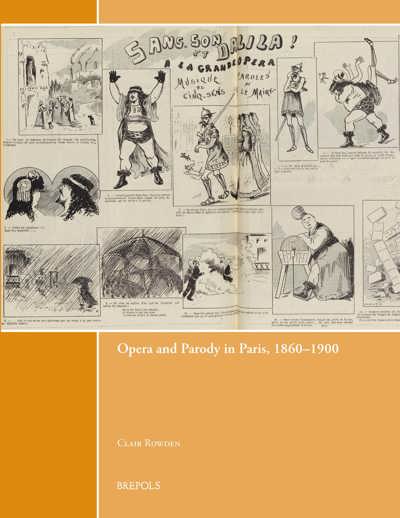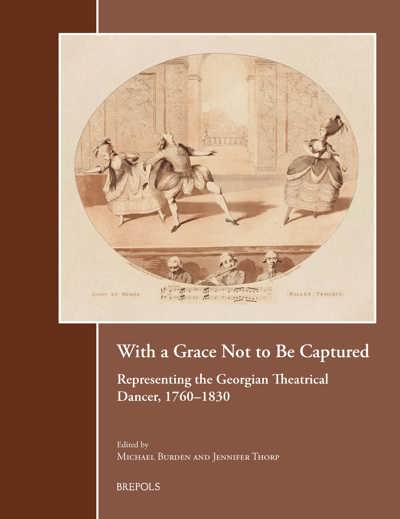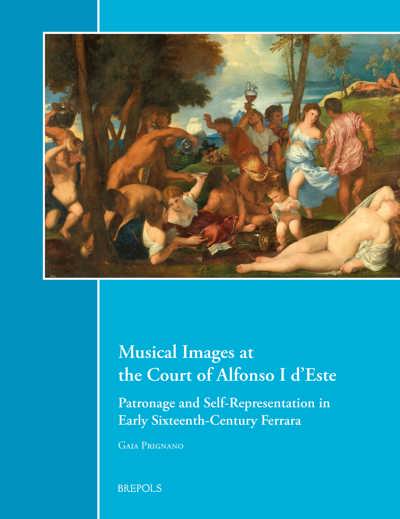
Opera and Parody in Paris, 1860-1900
Clair Rowden
- Pages: 161 p.
- Size:216 x 280 mm
- Illustrations:21 b/w, 4 col., 15 tables b/w., 15 musical examples
- Language(s):English
- Publication Year:2020
- € 80,00 EXCL. VAT RETAIL PRICE
- ISBN: 978-2-503-58362-4
- Paperback
- Available
Opera and Parody in Paris, 1860-1900 interrogates press caricatures and cartoons, popular song, staged revue and opera parodies to discover the role they play within the theatrical, social, and wider cultural context and economy they inhabit. These intertextual and intermedial ‘texts’ are analysed as reception documents, as ‘autonomous’ artistic products, as cultural phenomena to discover the ways in which their parody works, and for whom.
"Opera and Parody in Paris is full of sophisticated readings that are prefaced by a thoughtful chapter on the position of parody in theories of reading." (Mark Everist, Transposition [en ligne], 10, 2022, http://journals.openedition.org/transposition/7369)
« Son apport primordial est que l’auteure y met en valeur tout un répertoire « secondaire » – qui doit désormais être pris en compte dans l’étude du théâtre lyrique au XIXe siècle – et fait ressortir l’articulation continue de celui-ci avec la presse. Démarche d’autant plus louable qu’elle n’a pu être réalisée qu’en mettant au jour et en confrontant de multiples sources, souvent lacunaires, mais qui seules permettent une approche rigoureuse de la restitution du spectacle parodique. » (Philippe Blay, Revue de musicologie, 108/1, 2022, p. 213)
“Overall, the book was well researched and Rowden unearthed many primary and hitherto unpublished sources, which offered some useful background to understanding operatic parody, including some tasty anecdotes.” (Paul Clements, in The Journal of European Humour Research, 10/2, p. 158)
Clair Rowden is Reader in Musicology at Cardiff University. Her research deals with opera, musical theatre, reception, stage production, singers, dance and iconography in nineteenth-century France. She recently published the co-edited volume (with Richard Langham Smith) Carmen Abroad (Cambridge University Press, 2020), a transnational history of the performance of BizetCarmen which is richly supplemented by the website www.carmenabroad.org which Rowden curates. Other publications include the edited collections (with Michela Niccolai) Musical Theatre in Europe 18301945 (Brepols, 2017), and Performing Salome, Revealing Stories (Ashgate, 2013).
This study interrogates press caricatures and cartoons, staged revue and opera parodies to reveal the role they play within the Parisian theatrical, social and cultural sphere. From the beginnings of Wagner reception in Paris, through the heyday of opra-bouffe in the hands of that comic genius Herv, to the international operatic repertoire played on Parisian stages in the 1890s especially works by Verdi and Wagner performed during an increasingly tense nationalist climate alongside those by Massenet, Reyer and Saint-Sans this book examines the workings of parody which draws on opera for its subject material, its appeal, and for whom.
Parodys repetition of dramatic and musical conventions is compounded by the abundance of revue shows on Parisian stages, by prolific authors such as Clairville, which deftly used well-known opera and operetta repertoire alongside the scie that popular tune given new words countless times over to create new yet familiar theatrical experiences. Indeed, by the 1890s, the words and musics of Faust, Carmen and Guillaume Tell in particular, held resonant value to signify the operatic.
Aside from political caricature in which the figure of Wagner became embroiled, the ways in which parody brings together the high and the low to mock cultural norms, to neutralise alterity or innovation and refocus commentary onto internal, local, conventional and legitimised cultural products and debates becomes apparent. Opera and Parody in Paris, 18601900 thus uncovers a huge amount of primary and hitherto unpublished sources in an analysis of highly appealing intermedial materials that dominated Parisian print and stage culture in the late-nineteenth century.
Chapter One. Opera and Parody on Stage and in Print
The mechanisms of parody and theories of ‘reading’
Print and stage revue culture
Performance conditions
In defence of parody
Chapter Two. Tannhäuser on the Popular Stage
Panne-Aux-Airs
Ya-Mein-Herr
Conclusions
Chapter Three. Hervé and Faust on Parisian Stages in 1869
Hervé
Le petit Faust
Faustomania
Chapter Four. ‘Cariculture’ of the 1890s
The operatic repertoire
Lohengrin, Wagner and political caricature
Opera cartoons
Conclusions
Chapter Five. Staged Parody and the Acceptance of Wagner
Carmen
Back to Wagner
Lohengrin
Salammbô
La Walkyrie
Massenet and Verdi
Back to Wagner (again)
Concluding Remarks
Bibliography




